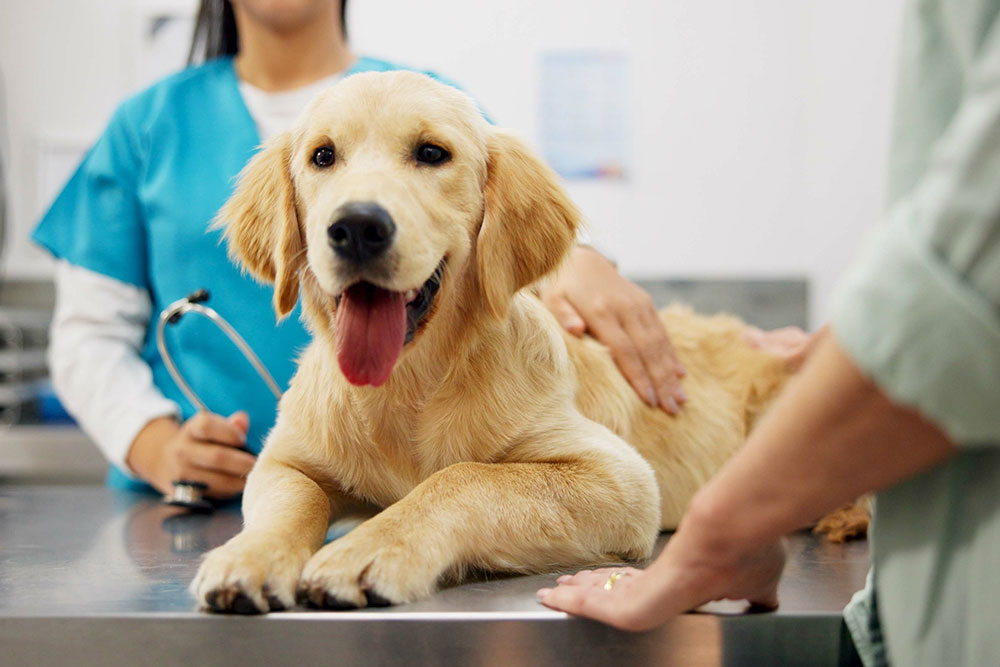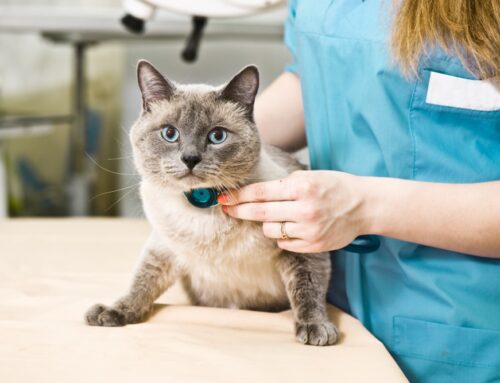Why Regular Vet Checkups Matter for Your Pet’s Long-Term Health
Your pet might seem perfectly healthy, playing, eating, and greeting you every day, but some of the most serious illnesses develop quietly long before symptoms appear.
That’s why regular vet checkups are so important. At Animal Hospital Southwest, our Fort Worth team helps families protect their pets through early detection and preventive care. A yearly visit keeps your dog or cat feeling their best and can even add years to their life.
Why Regular Vet Visits Matter
Understanding the Silent Progression of Disease
Your dog might still chase tennis balls with enthusiasm, and your cat may purr contentedly on your lap. Yet, both could be harboring serious health conditions that don’t show obvious symptoms for months or even years.
Some conditions progress silently for months or years:
- Kidney disease often shows no outward signs until most function is lost. Routine blood and urine tests during a wellness exam can catch it early. Chronic Kidney Disease in Cats exemplifies this silent progression, often advancing undetected until significant damage has occurred.
- Arthritis develops gradually; slowed movement or reluctance to jump isn’t just aging, it’s discomfort we can relieve with early treatment.
- Heart disease can remain hidden while pets act normal. Listening for murmurs or irregular rhythms during an exam allows intervention before heart failure develops. Early detection through routine exams lets us implement management strategies before advanced heart failure appears.
These are just a few examples of why consistent veterinary visits matter. Detecting problems early means easier, more effective treatment and a higher quality of life.
Building a Comprehensive Health History
Every wellness exam adds to a comprehensive medical record that becomes invaluable over your pet’s lifetime. This history helps us identify subtle changes, such as gradual weight loss, shifts in heart rate patterns, or early dental disease, that might otherwise go unnoticed.
A strong baseline for blood work and vitals lets us detect deviations quickly and tailor care. Tracking your pet’s typical weight and previous responses to treatment supports more precise, effective decisions when health issues arise.
What Happens During a Wellness Exam?
Conducting a Comprehensive Physical Examination
A thorough wellness exam involves much more than a quick look and listen. We evaluate every major body system to identify potential problems before they become serious.
We begin with the skin and coat, which often reflect internal health status. We check for unusual lumps, irritations, or changes in coat quality that might indicate hormonal imbalances or nutritional deficiencies. Eye examinations can reveal early signs of issues ranging from glaucoma to systemic diseases like diabetes.
Joint function assessment helps us spot arthritis or mobility problems that benefit from early intervention. We carefully evaluate lung and heart function, listening for murmurs, irregular rhythms, or breathing abnormalities that warrant further investigation.
Palpation of major organs can detect enlargement, unusual masses, or areas of sensitivity that signal underlying problems. For pets with chronic ear issues, we utilize advanced diagnostic tools like Video-Otoscopy to thoroughly examine ear canals and identify root causes of persistent infections.
Understanding Diagnostic Tests and Their Importance
Physical exams provide valuable information, but diagnostic tests reveal what we cannot see or feel. Blood work gives insight into organ function, helping identify liver disease, kidney problems, or diabetes before clinical symptoms appear.
The Importance of Blood Work for Your Dog cannot be overstated. Tests establish baseline values for future comparison and catch diseases in their earliest stages. Urinalysis adds detail about kidney function and can detect urinary tract infections or other abnormalities.
These routine tests frequently uncover conditions like Hypothyroidism in Dogs, which owners often attribute to aging but which respond well to treatment when properly diagnosed.
Addressing Age-Specific Concerns
Puppies and Kittens: Getting Started on the Right Paw
Young pets need specialized attention during rapid growth and development. Early wellness exams establish health baselines and ensure proper vaccination schedules to protect against serious diseases. These visits also provide opportunities for microchipping with Home Again chips, giving you peace of mind if your pet becomes lost.
Puppy and kitten visits focus on preventive care: parasite prevention, nutritional guidance, and behavioral counseling that set the foundation for lifelong health and good habits.
Senior Pets: Providing Extra Care for Golden Years
As pets age, risks for arthritis, diabetes, and cognitive changes increase. Not So Sweet: Diabetes in Pets illustrates how this manageable condition can significantly impact quality of life when left undiagnosed.
For seniors with arthritis or age-related pain, we now have excellent options including Solensia for cats and Librela for dogs. These monthly injections can dramatically improve comfort and mobility.
Regular Senior Care visits become even more critical with age, as health changes accelerate and early detection is essential for successful management.
Preventive Care: The Foundation of Health
Preventive care is the key to keeping your pet happy, comfortable, and active for years to come. Each checkup is an opportunity to strengthen the foundation of your pet’s health by addressing the four pillars of prevention: vaccines, parasite protection, dental care, and nutrition.

Vaccinations: Protection That Lasts a Lifetime
Vaccines help your pet’s immune system recognize and fight off dangerous diseases before they cause harm. Your veterinarian will create a customized vaccine schedule based on your pet’s age, lifestyle, and environment.
- Core vaccines protect against widespread threats such as rabies, distemper, and parvovirus in dogs, and feline panleukopenia and calicivirus in cats.
- Lifestyle vaccines guard against region-specific or exposure-based risks, including Bordetella (“kennel cough”), leptospirosis, and feline leukemia.Keeping vaccines current not only protects your pet but also helps safeguard the greater Fort Worth pet community.
Parasite Prevention: Year-Round Defense
Fleas, ticks, heartworms, and intestinal parasites can strike any time of year in Texas. These pests aren’t just annoying, they can transmit serious illnesses like Lyme disease, ehrlichiosis, and heartworm disease.
- Preventive medication is safer, easier, and far less costly than treatment.
- We tailor prevention plans based on your pet’s daily life—whether they hike, visit dog parks, or stay mostly indoors.
Monthly parasite prevention keeps your pet comfortable and prevents avoidable medical emergencies.
Dental Care: More Than Fresh Breath
Healthy teeth and gums do more than make for a nice smile, they directly affect your pet’s overall well-being.
- Plaque and tartar harbor bacteria that can travel to the heart, liver, and kidneys.
- Regular professional cleanings remove buildup below the gumline where brushing can’t reach.
- At-home brushing, dental diets, and chew treats extend the benefits between cleanings.
Our team checks your pet’s mouth at every visit to identify early dental disease before it causes pain or infection.
Nutrition & Weight: Fuel for a Healthy Life
A balanced diet is one of the most powerful forms of preventive medicine. Obesity now affects more than half of household pets and increases the risk for arthritis, diabetes, and heart disease. Even a few extra pounds can shorten a pet’s lifespan and reduce their comfort.
- We evaluate your pet’s body condition score at every checkup.
- Nutrition plans are tailored to your pet’s age, activity level, and medical history.
- Regular weigh-ins and dietary adjustments help maintain long-term success. Your vet can guide you toward a healthy, realistic plan that supports your pet’s energy, mobility, and longevity. The Pet Obesity Prevention Resources offer valuable information for maintaining an ideal body condition.
Busting Pet Health Myths: What Owners Often Miss
“My pet seems fine, so they don’t need to go.”
Many diseases develop silently. Checkups catch them before symptoms appear, when treatment is simplest and least expensive.
“Senior pets don’t need as many visits.”
In reality, older pets need more monitoring. Subtle changes can escalate quickly, and early detection preserves comfort and independence. Preventive Testing for Senior Pets provides valuable insights into the special needs of aging animals.
FAQs
How often should my pet have a vet checkup?
Most dogs and cats should see the vet once a year. Seniors or pets with medical conditions benefit from every six months.
What does a wellness exam include?
A full physical, dental review, weight assessment, and preventive care updates such as vaccines and parasite control.
Why run blood tests if my pet looks healthy?
Bloodwork reveals organ changes long before outward signs appear, allowing earlier, more effective care.
Do indoor cats need checkups too?
Yes. Indoor pets are still prone to dental issues, obesity, and age-related diseases.
Taking the Next Step
Schedule Your Pet’s Wellness Exam Today
Don’t wait for symptoms to appear before scheduling your pet’s next wellness visit. Our convenient online booking tool makes scheduling easy and efficient. As an AAHA Accredited hospital, we maintain the highest standards of veterinary care and client service.
Your Fort Worth Veterinary Partner
Have questions about your pet’s health or our wellness programs? Our team is ready to assist you. Regular vet visits are one of the simplest and most powerful ways to keep your pet healthy. At Animal Hospital Southwest, we combine advanced diagnostics with compassionate care to make every checkup thorough, stress-free, and tailored to your pet’s needs.
Call (817) 292-8655 or book your appointment online to schedule your pet’s next checkup today. Together, we’ll make sure your best friend enjoys their happiest and healthiest years.






Leave A Comment